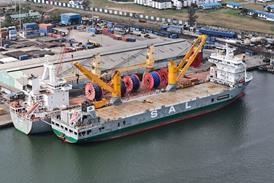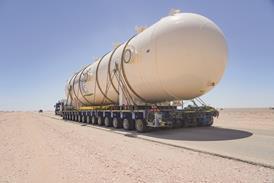July 3 - Providers of project logistics services will be interested to read that over the past two decades, China has become Africa's most important economic partner according to a report from McKinsey & Company.
In the report - 'Dance of the lions and dragons: How are Africa and China engaging, and how will the partnership evolve?' - McKinsey interviewed more than 100 senior African business and government leaders, as well as the owners or managers of more than 1,000 Chinese firms spread across eight African countries.
McKinsey said Chinese "dragons" - firms of all sizes and sectors - are bringing capital investment and managerial know-how, accelerating the development of African economies, adding that today an estimated 10,000 Chinese-owned firms have established a presence in Africa.
Around 90 percent of Chinese firms invested in Africa are privately owned - challenging the preconceived notion that foreign direct investment into Africa is the reserve of state-owned entities. However, state-owned enterprises tend to be larger and have a strong presence in specific sectors such as energy and infrastructure.
The survey also found that Chinese firms dominated 50 percent of Africa's international engineering, procurement and construction (EPC) market.
Nearly a third of Chinese firms active in Africa are involved in manufacturing. McKinsey estimates that 12 percent of Africa's industrial production - valued at some USD500 billion a year - is already handled by Chinese firms. Furthermore, the Chinese firms interviewed are primarily focused on serving the needs of Africa's fast-growing markets rather than on exports.
The report focuses on eight major African economies. Ethiopia and South Africa have a clear strategic alignment with China and are described as robust partners. Both countries have translated their national economic-development strategies into specific initiatives related to China, and they have also developed important relationships with Chinese provinces and with Beijing.
Solid partners - including Kenya, Nigeria, and Tanzania - do not yet have the same level of engagement with China as Ethiopia and South Africa. However, government relations are improving, and Chinese investment activity is growing.
With unbalanced partners, such as Angola and Zambia, engagement with China has been quite narrowly focused. For Angola, the government has supplied oil to China in exchange for Chinese financing and construction of major infrastructure projects. However, market-driven private investment by Chinese firms has been limited, compared with other African countries.
Ivory Coast is described as a nascent partner. It is at the beginning of developing a partnership with China, so the model has yet to become clear.
But, how quickly will the Africa-China relationship grow in the decade ahead?
McKinsey forecasts two scenarios. In the first, the revenues of Chinese firms in Africa grow to reach around USD250 billion in 2025, up from USD180 billion today. In this business as usual scenario, Chinese firms would grow in line with the market, holding their current market shares steady as the African economy expands. Under this scenario, the same three industries that dominate Chinese business in Africa today - manufacturing, resources, and infrastructure - would dominate in 2025 as well.
In a second scenario, Chinese firms in Africa could dramatically accelerate their growth. By expanding aggressively in both existing and new sectors, these firms could reach revenues of USD440 billion in 2025. In this accelerated-growth scenario, the three established industries of Chinese investment grow faster than the economy, and Chinese firms will also make significant forays into five new sectors: agriculture, banking and insurance, housing, information communications technology and telecommunications, and transport and logistics.
You can read the report here.
The USD4 billion Addis Ababa-Djibouti railway was financed through the Export-Import Bank of China.
Photo credit: Gui Yiming

















